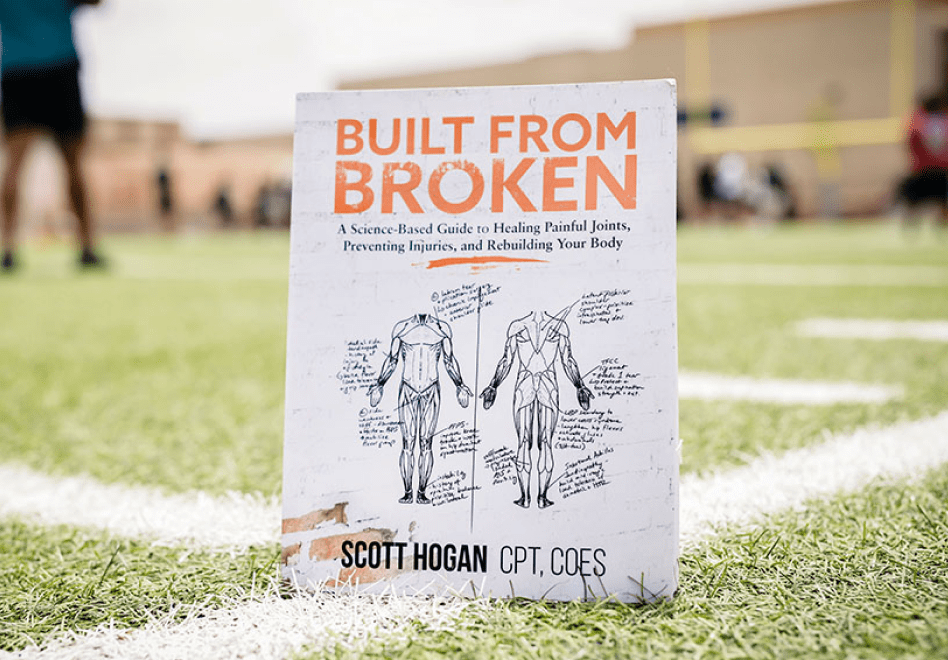
Be built (to last).
The right supplements can help you recover naturally and build a resilient body.

Supplement Quiz
Take this short quiz to discover the perfect supplements for your needs and goals.
About SaltWrap

Built from Broken
Get the best-selling book from SaltWrap founder, Scott Hogan, and start rebuilding today.
The Worst Diet Combo for Stress & Adrenal Fatigue
by Scott Hogan, ACE-CPT, COES
Warren Buffett’s longtime business partner, Charlie Munger, is known for his simple yet powerful mental models.
One of his most famous is called inversion thinking — the practice of solving problems by flipping them on their head.
Instead of asking, “What do I want to accomplish?” Munger would ask, “What would completely ruin this?”
Then he’d avoid those actions at all costs.
It’s a surprisingly effective strategy. And it applies to health just as much as business.
So, instead of asking how to optimize your energy, focus, and stress resilience, let’s flip the question:
What habits and diet combinations might completely ruin them?
The "Triple Threat" Diet Combo That Crashes Your Adrenals
If you wanted to design a diet that virtually guarantees low energy, poor stress resilience, and eventual adrenal burnout, it would look like this:
-
Skip breakfast (intermittent fasting)
-
Cut carbs to near zero (low-carb or ketogenic diet)
-
Rely on caffeine to stay alert and productive throughout the day
Of course, each of these strategies can be beneficial — when you use them correctly.
But when you combine them? It risks creating a metabolic storm that can overwhelm your body’s stress-response system — especially in the adrenal glands.
Think of it like this: each habit adds another layer of physiological stress. Together, they make it nearly impossible for the body to recover and self-regulate.
Adrenals 101
What are the adrenal glands, exactly?
In short, they are two small, triangular glands atop the kidneys that produce hormones that help regulate critical bodily functions:
-
Cortisol and epinephrine (AKA adrenaline) for stress response, or the “fight or flight” reaction.
-
Aldosterone for blood pressure and fluid balance, by way of sodium and potassium regulation.
-
Glucagon for stabilizing blood sugar levels.
-
Sex hormones like testosterone and estrogen, which — in addition to maintaining reproductive health and function — help regulate things like metabolism, mood, immune function, and bone health.
So, you can see why adrenal health should never fly under the radar if you want to optimize athletic performance and overall wellness.
Why This Diet Combo Backfires
You might feel like you're doing everything right when you combine these three approaches. But here’s what’s actually happening beneath the surface:
-
Fasting tells your body that fuel is scarce.
-
Low-carb eating limits your access to quick energy (glucose).
-
Caffeine stimulates the nervous system, telling your body to stay in “go” mode.
Each of these signals activates your adrenals. That’s fine in moderation. But chronic activation can lead to adrenal exhaustion — where your body’s ability to respond to stress becomes blunted.
Common signs can include:
-
Afternoon energy crashes
-
Difficulty waking up in the morning
-
Feeling “tired but wired” at night
-
Sugar or salt cravings
-
And brain fog or increased feelings of anxiety.
Again, these approaches can be useful tools when used selectively. But too many stressors at once can send the wrong signals to your body.
Instead of recovery and balance, you get a body that stays stuck in a constant “alarm mode.”
How To Fix It (Without Giving Up Everything)
You don’t need to abandon fasting, caffeine, or low-carb eating entirely.
Instead, the solution is to manage the overall stress load — not eliminate every useful tool.
Here’s how:
1. Focus on one stressor at a time.
If you’re fasting, don’t also go extremely low-carb. If you’re following a ketogenic diet, avoid excessive caffeine.
Choose one main lever to pull — and then give your system time to adapt.
2. Reintroduce carbohydrates strategically.
Carbs aren’t the enemy — especially around exercise or high-stress periods. They help stabilize cortisol and restore glycogen, which keeps energy and mood more stable. Instead of eliminating carbs (or close to it), choose whole-food sources — like sweet potatoes and tart berries — that your body can recognize and put to use.
Even better, try to eat the majority of your carbs at dinner rather than early in the day to help improve sleep and recovery. This may also help reduce your chances of having any late-night snack cravings.
3. Cycle caffeine.
Caffeine should be a tool, not a crutch. If taking one or two caffeine-free days per week sounds like a punishment to you, try to gradually reduce your daily intake instead.
Where your caffeine comes from makes a difference, too. Opt for organic black coffee, green tea, or matcha instead of energy drinks for lighter stimulation and added antioxidants.
4. Support your adrenals with minerals and adaptogens.
Your adrenals depend on adequate sodium, potassium, and magnesium — along with plant compounds called adaptogens (like ashwagandha and rhodiola) that help balance your stress response.
A science-backed, natural-based adaptogen supplement — like Adaptogen Greens™ — can help make this process easier by supporting energy, mood, and recovery without overstimulating the adrenals.
Final Thoughts
Charlie Munger’s approach reminds us that progress often comes from identifying what not to do.
Instead of adding more strategies, supplements, or restrictions, start by removing the things that quietly undermine your health.
Ask yourself: “What am I doing that’s pushing me toward the opposite of what I want?”
The truth is that you can only push your body so far before it pushes back.
Intermittent fasting, cutting carbs, and relying on caffeine might feel productive in the short term. But together, they’re a recipe for long-term burnout.
Here's the smarter approach:
-
Choose one metabolic stressor at a time.
-
Reintroduce the right fuel when needed.
-
Support your adrenal health with minerals and adaptogens.
Remember that the goal isn’t just to perform well today — it’s to stay strong, focused, and resilient for the long haul.
Founder: Scott Hogan

I created SaltWrap to bring together the most practical ideas in therapeutic sports nutrition, corrective exercise, and functional fitness — with the goal of keeping you (and myself) strong, mobile, and built to last.
I've worked as an A.C.E. Certified Personal Trainer, Orthopedic Exercise Specialist, and nutritional supplement formulator.
But more importantly — I've spent most of my life battling injuries, joint pain, and just being plain beat up. So I know what it's like to struggle toward fitness goals.
SaltWrap is here to push you through injuries, setbacks and perceived physical limitations. To a place beyond what you think you're capable of. Sign up here to stay in the loop.
Learn more about my best-selling injury prevention and recovery book, Built from Broken.







